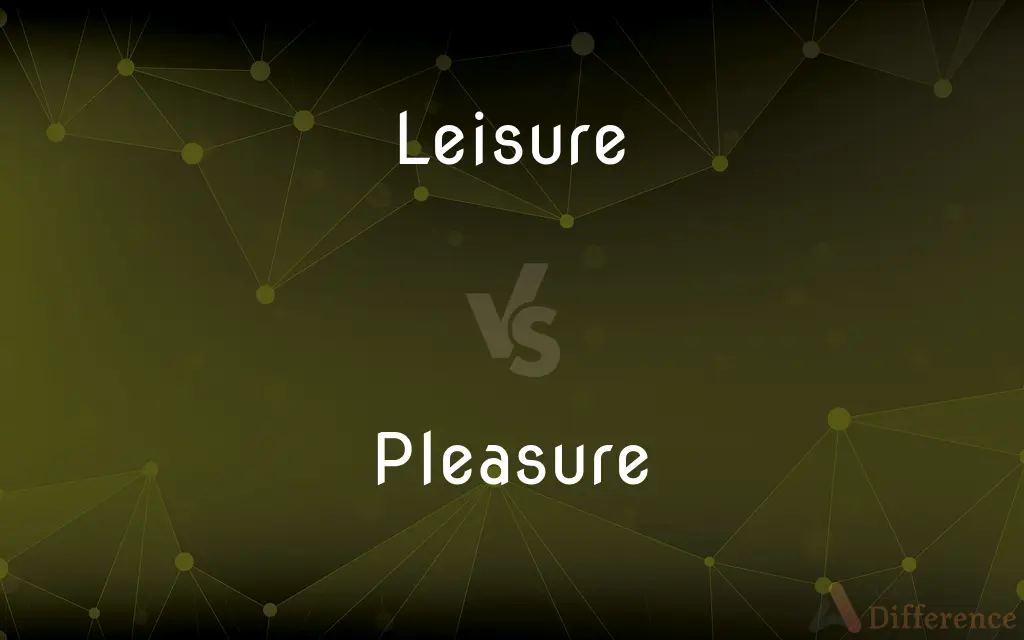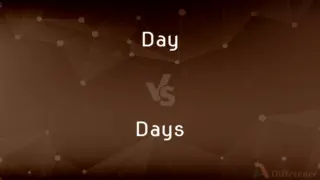Leisure vs. Pleasure — What's the Difference?
By Tayyaba Rehman & Fiza Rafique — Updated on April 22, 2024
Leisure refers to free time spent away from business, work, and domestic chores, while pleasure is the feeling of happiness or satisfaction derived from enjoyable experiences.

Difference Between Leisure and Pleasure
Table of Contents
ADVERTISEMENT
Key Differences
Leisure is the time available to individuals after fulfilling all their obligations and responsibilities, providing opportunities for relaxation or activities of personal interest. On the other hand, pleasure can be experienced at any time and arises from activities or experiences that bring joy, satisfaction, or a sense of fulfillment.
Leisure time is specifically set aside for relaxation or hobbies and is often planned. For example, weekends or vacations are typical periods of leisure. Whereas pleasure is not confined to specific times or activities; it can be derived spontaneously from various sources like eating a favorite meal, enjoying a hobby, or spending time with loved ones.
Leisure activities are varied, including reading, sports, watching movies, or pursuing hobbies, and are chosen based on personal preferences. In contrast, the sources of pleasure are broader and highly subjective, ranging from physical sensations to emotional experiences, depending on what an individual finds enjoyable or fulfilling.
The concept of leisure is closely tied to the idea of escape from daily routines and stress. It's often seen as a necessary part of a balanced life, contributing to personal well-being and health. Pleasure, however, is associated with the immediate enjoyment and can significantly enhance one's mood or quality of life momentarily.
In some instances, leisure and pleasure can overlap; leisure activities can certainly be pleasurable. However, not all leisure activities may result in pleasure if they don’t align with a person’s interests, and not all pleasurable activities are performed during leisure time, such as enjoying a chat with a colleague during work.
ADVERTISEMENT
Comparison Chart
Definition
Free time away from obligations.
Feeling of happiness or enjoyment.
Time
Specific periods designated for rest.
Can occur at any time.
Activities
Hobbies, sports, relaxation.
Any enjoyable or satisfying experience.
Purpose
To relax and recharge.
To experience joy or satisfaction.
Dependency
On having free time.
On personal preferences and immediate context.
Compare with Definitions
Leisure
Planned relaxation.
They planned a leisure trip to the beach for the weekend.
Pleasure
Spontaneous joy.
A spontaneous road trip brought them great pleasure.
Leisure
Personal interest pursuits.
His leisure pursuits include painting and playing guitar.
Pleasure
Enjoyable experiences.
Dining at fine restaurants is a pleasure they indulge in.
Leisure
Non-work activities.
Leisure activities like hiking and swimming help him unwind.
Pleasure
Enhances mood.
The pleasure of a warm bath after a long day is unmatched.
Leisure
Escape from routine.
The weekend offers necessary leisure for escaping the weekly grind.
Pleasure
Satisfaction from activities.
She derives pleasure from solving complex puzzles.
Leisure
Free time.
She spends her leisure time gardening and reading novels.
Pleasure
Feeling of happiness.
He felt immense pleasure watching the sunset.
Leisure
Leisure has often been defined as a quality of experience or as free time. Free time is time spent away from business, work, job hunting, domestic chores, and education, as well as necessary activities such as eating and sleeping.
Pleasure
Pleasure refers to experience that feels good, that involves the enjoyment of something. It contrasts with pain or suffering, which are forms of feeling bad.
Leisure
Free time when one is not working or attending to other duties.
Pleasure
A feeling of happy satisfaction and enjoyment
She smiled with pleasure at being praised
Leisure
Relaxation or activities engaged in during such time
The pursuit of leisure.
Pleasure
Used or intended for entertainment rather than business
Pleasure boats
Leisure
Freedom provided by the cessation of activities.
Pleasure
The state or feeling of being pleased or gratified.
Leisure
Free time, time free from work or duties.
Pleasure
A source of enjoyment or delight
The graceful skaters were a pleasure to watch.
Leisure
Time at one's command, free from engagement; convenient opportunity; hence, convenience; ease.
Pleasure
Amusement, diversion, or worldly enjoyment
"Pleasure ... is a safer guide than either right or duty" (Samuel Butler).
Leisure
Freedom from occupation or business; vacant time; time free from employment.
The desire of leisure is much more natural than of business and care.
Pleasure
Sensual gratification or indulgence.
Leisure
Time at one's command, free from engagement; convenient opportunity; hence, convenience; ease.
He sighed, and had no leisure more to say.
Pleasure
One's preference or wish
What is your pleasure?.
Leisure
Unemployed; as, leisure hours.
Pleasure
To give pleasure or enjoyment to; gratify
Our host pleasured us with his company.
Leisure
Time available for ease and relaxation;
His job left him little leisure
Pleasure
To take pleasure; delight
The hiker paused, pleasuring in the sounds of the forest.
Leisure
Freedom to choose a pastime or enjoyable activity;
He lacked the leisure for golf
Pleasure
To go in search of pleasure or enjoyment.
Pleasure
(uncountable) A state of being pleased or contented; gratification.
He remembered with pleasure his home and family.
I get a lot of pleasure from watching others work hard while I relax.
Pleasure
(countable) A person, thing or action that causes enjoyment.
It was a pleasure to meet you.
Having a good night's sleep is one of life's little pleasures.
Pleasure
(uncountable) One's preference.
What is your pleasure: coffee or tea?
Pleasure
The will or desire of someone or some agency in power.
To hold an office at pleasure: to hold it indefinitely until it is revoked
At Congress's pleasure: whenever or as long as Congress desires
Pleasure
Pleased to meet you, "It's my pleasure"
Pleasure
(transitive) To give or afford pleasure to.
Pleasure
To take pleasure; to seek or pursue pleasure.
To go pleasuring
Pleasure
The gratification of the senses or of the mind; agreeable sensations or emotions; the excitement, relish, or happiness produced by the expectation or the enjoyment of something good, delightful, or satisfying; - opposed to pain, sorrow, etc.
At thy right hand there are pleasures for evermore.
Pleasure
Amusement; sport; diversion; self-indulgence; frivolous or dissipating enjoyment; hence, sensual gratification; - opposed to labor, service, duty, self-denial, etc.
He that loveth pleasure shall be a poor man.
Lovers of pleasures more than lovers of God.
Pleasure
What the will dictates or prefers as gratifying or satisfying; hence, will; choice; wish; purpose.
Use your pleasure; if your love do not presuade you to come, let not my letter.
Pleasure
That which pleases; a favor; a gratification.
Festus, willing to do the Jews a pleasure
Pleasure
To give or afford pleasure to; to please; to gratify.
[Rolled] his hoop to pleasure Edith.
Pleasure
To take pleasure; to seek pursue pleasure; as, to go pleasuring.
Pleasure
A fundamental feeling that is hard to define but that people desire to experience;
He was tingling with pleasure
Pleasure
Something or someone that provides pleasure; a source of happiness;
A joy to behold
The pleasure of his company
The new car is a delight
Pleasure
A formal expression;
He serves at the pleasure of the President
Pleasure
An activity that affords enjoyment;
He puts duty before pleasure
Common Curiosities
Are leisure and pleasure mutually exclusive?
No, while they are distinct concepts, leisure activities can be pleasurable, and pleasure can be derived from non-leisure activities as well.
What is leisure?
Leisure refers to the time spent away from one's duties, typically used for relaxation or hobbies.
What does pleasure mean?
Pleasure is the feeling of happiness, satisfaction, or enjoyment that one experiences from various activities or sensations.
How can leisure lead to pleasure?
Leisure activities that align with personal interests and provide relaxation or enjoyment can lead to feelings of pleasure.
Can work-related activities provide pleasure?
Yes, work-related activities can provide pleasure if they are enjoyable or fulfilling, despite not being leisure time.
How can one optimize leisure time for maximum pleasure?
Engaging in activities that one truly enjoys and finds relaxing or fulfilling can optimize leisure time for maximum pleasure.
Can pleasure be planned?
While some pleasurable experiences can be planned, like vacations or outings, many pleasurable moments happen spontaneously.
What types of activities are typically considered leisure?
Typical leisure activities include sports, reading, crafting, and other hobbies that allow for relaxation and enjoyment.
Can leisure activities ever be unpleasurable?
Yes, if leisure activities are not enjoyable or do not align with a person’s interests, they might not lead to pleasure.
Is all pleasure beneficial?
Not all forms of pleasure are beneficial, especially if they lead to unhealthy habits or interfere with daily responsibilities and well-being.
Why is leisure important?
Leisure is important as it helps individuals unwind, recharge, and maintain a balanced lifestyle, improving overall well-being.
How do preferences affect pleasure?
Individual preferences greatly influence what activities or experiences can provide pleasure, as pleasure is highly subjective.
What role does pleasure play in quality of life?
Pleasure enhances quality of life by providing moments of joy and satisfaction, contributing to overall happiness and well-being.
Is leisure the same as laziness?
No, leisure is an important and productive use of free time for personal development and relaxation, distinct from laziness.
How does culture influence perceptions of pleasure?
Cultural background can influence what is considered pleasurable, as different cultures value different activities and sensations.
Share Your Discovery

Previous Comparison
Luxury vs. Deluxe
Next Comparison
Day vs. DaysAuthor Spotlight
Written by
Tayyaba RehmanTayyaba Rehman is a distinguished writer, currently serving as a primary contributor to askdifference.com. As a researcher in semantics and etymology, Tayyaba's passion for the complexity of languages and their distinctions has found a perfect home on the platform. Tayyaba delves into the intricacies of language, distinguishing between commonly confused words and phrases, thereby providing clarity for readers worldwide.
Co-written by
Fiza RafiqueFiza Rafique is a skilled content writer at AskDifference.com, where she meticulously refines and enhances written pieces. Drawing from her vast editorial expertise, Fiza ensures clarity, accuracy, and precision in every article. Passionate about language, she continually seeks to elevate the quality of content for readers worldwide.














































